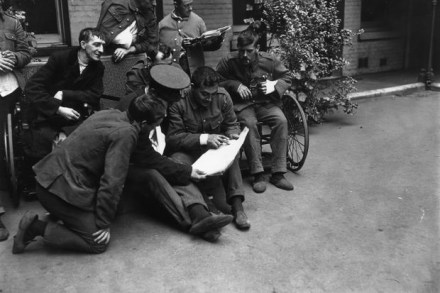Books and arts – 11 September 2014

With only seven days to go until the referendum, urgent action is needed to help save the Union. In this week’s issue, we asked Spectator readers to write to Scottish voters, saying why they are hoping for a ‘No’ vote. The response was extraordinary. You can read some of the letters here. Fraser Nelson is


‘An apology’, From The Spectator, 12 September 1914: WE are informed that a story told in a letter from a correspondent signing herself “A Country District Visitor,” and published on August 22nd, 1914, has had an injurious effect upon Mr. C. H. Schuhmacher, Chemist, of Heswall, Cheshire. In contradiction of the statements quoted in that
‘An apology’, from The Spectator, 12 September 1914: We are informed that a story told in a letter from a correspondent signing herself ‘A Country District Visitor’, and published on August 22nd, 1914, has had an injurious effect upon Mr C.H. Schuhmacher, Chemist, of Heswall, Cheshire. In contradiction of the statements quoted in that letter, we

[audioplayer src=”http://traffic.libsyn.com/spectator/TheViewFrom22_11_Sept_2014_v4.mp3″ title=”Fraser Nelson, Tom Holland and Leah McLaren discuss how we can still save the Union” startat=50] Listen [/audioplayer]At 9.30 p.m. last Saturday news broke that Scotland’s ‘yes’ campaign had established its first opinion poll lead. Since then, the country has been confronting the possibility of its impending dissolution. The vote will affect all
The papers of Monday published the welcome news that Britain, France, and Russia have agreed ‘not to conclude peace separately during the present war.’ Of course, it was quite unthinkable that Britain, France, or Russia should be so base as to make terms at the expense of her friends. Nevertheless, a signed pledge is an excellent

From The Spectator, 12 September 1914: WE are not going to begin shouting before we are out of the wood. We say this out of no foolish superstition that it is unlucky to do so, but for the very plain and good reason that we are not out of the wood, though we admit that

From The Spectator, 12 September 1914: We were unable to find space last week in which to chronicle the election of the new Pope—Cardinal della Chiesa. Let us trust that, though he takes possession of the Holy See at a period of such stress and storm, the major part of his pontificate may be peaceful

‘The Magazines’, from The Spectator, 5 September 1914: THE most interesting paper in the new Nineteenth Century is that by Sir Harry Johnston on “The German War and its Consequences.” Writing as one with many German friends, he sets forth the reasons why his love for Germany has changed to righteous anger. They are, briefly,

THE WAR AND THE CIVIL SERVICE. [To the Editor of The Spectator] SIR,—May I suggest that some of the normal public services may, for the time, be curtailed in order to give patriotic young men the opportunity of serving their country in another way? The number of deliveries of letters might be reduced without serious

From The Spectator, 5 September 1914: LONDON changes day by day, and the London of the first few days of the war lies far in the past, distant for all of us by differently measured aeons of time. The trainloads of troops, the horses, the hurry, the altered railway service, the packed streets, the questioning


‘I’m stuffed.’

‘You’ll have to excuse Meridith, he was raised by wolves.’
‘Gentlemen, shall we join the lardies?’

‘Karl isn’t himself today.’
Tarzan of the vapes